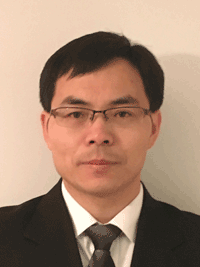Associate Professor
Department of Radiation Oncology
Director, Radiobiology

| Address: | Hazelrig-Salter Radiation Oncology Center, 2220A UAB, Birmingham, AL 35233 |
| Telephone: | (205) 975-0521 |
| Email: | lshi@uab.edu |
| Publications |
__________________________________________________________
Education
MBBS, (Medicine), Zhengzhou University College of Medicine
Ph.D. (Neurotoxicology), Purdue University
Postdoctoral Research Associate,University of Wisconsin-Madison
Research Fellow, St. Jude Children’s Research Hospital
Research Interests
Identifying novel targets to improve immune checkpoint blockers
Our recent studies (Cell and Nature Communications, 2016) and previous reports demonstrated that immune checkpoint blockers (ICBs) (e.g., anti-CTLA-4) exert similar functional outcomes to those of common metabolic pathways (e.g., mTOR) (JEM and Immunity, 2011), i.e., promoting effector T cell (Teff) function (IFN-γ production) and depleting regulatory T cells (Treg). Interestingly, these effects are selectively induced in the tumor microenvironment , a special metabolic milieu with numerous features impacting the mTOR pathway. Given this key information, whether ICBs engage the mTOR pathways and its downstream targets in tumor-infiltrating T cell (TILs) is largely unknown and targeting these metabolic checkpoints as novel approaches to enhance therapeutic efficacy of ICBs remains to be explored. We will combine genetic mouse models with specific deletion of those genes in T cells, genetic manipulations with retroviral overexpression and CRISPR-CAS9 deletion, pharmacological approaches with metabolic inhibitors and activators, transplantable and orthotopic tumor models, and adoptive T-cell therapy (another promising modality in cancer immunotherapy) to evaluate therapeutic value of targeting these metabolic targets as a standalone therapy, or in combination with ICBs and conventional radiotherapy and chemotherapy. Further, we have an ongoing study showing that co-stimulatory molecule ICOS has an indispensable role in maintaining the survival and functionality of adoptively transferred tumor antigen-specific CD8+ T cells, especially when combined with ICBs. Currently, agonistic anti-ICOS therapeutic antibodies are being tested in Phase I clinical trials. Further mechanistic understanding will help guide these clinical trials and offer rationales to test additional combination therapies.
Functional and transcriptional control of T cell development and differentiation
The mTOR pathway is a master regulator for T cell metabolism, differentiation and function, with prominent roles in cancer, autoimmunity, and vaccination for infectious diseases. While the downstream targets of mTOR have been extensively studied, its upstream regulators are under-studied and an answer to which may offer potential therapeutic targets for various pathologies. Interestingly, TCR signaling regulates both Gfi1 expression and mTOR activity, suggesting Gfi1 and mTOR might crosstalk with each other. We will examine whether Gfi1 serves as an upstream regulator of the mTOR signaling. How the Gfi1-mTOR interaction dictates T cell development and acquisition of effector functions will be assessed using genetic mouse models and mouse autoimmune disease and tumor models. We recently showed that Gfi1 is required for anti-tumor immunity (PNAS, 2013) and for T cell maturation (PNAS, 2017). This study will offer new insights into whether mTOR pathway is the downstream link.